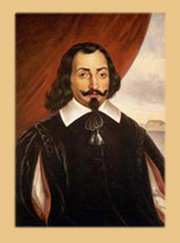 |

 |
 |

 |

January 29, 1999 Halifax Herald
Champlain: Canada's founding father
Many Canadians of English heritage presume that England was responsible for planting the seeds that became Canada. Not so. Canada's existence is owed to the fortitude of French explorer Samuel de Champlain. He provided the basis for the evolution of modern Canada by founding two North American settlements, Port Royal in 1605 and Quebec City in 1608.
In a December 27, 1998, column, Quebec City journalist Peter Black nicely portrays Champlain's place in Canadian history. He quotes historian Arthur Lower: "No Champlain no Quebec." Black notes that historians mostly agree that without New France, provinces such as Nova Scotia would likely be American States. Conclusion: no New France, no Canada. Ironically, if Champlain's Quebec secedes, Canada will probably disappear anyway.
"Greed," a vice that is the mainstay of the world's market economies, will be the prime factor determining the fate of our country. If Quebec departs the governments of Alberta, British Columbia and Ontario, rather than seeing living standards reduced, will likely apply for statehood and be accepted. Because of their resources, the three would take their places among the States that wield the most economic and political clout.
The fate of the Atlantic Provinces is less clear. If, by some miracle, the Americans did accept us and our economic ills, we would be more prosperous than we are now. Under the present arrangement, Central Canada gets all the gravy we get the crumbs.
Besides greed, kinship will be a factor in settling our fate, Atlantic Canadians have a lot of kin in the United States, especially New England.
Quebec will justify its departure by stating that independence will improve its ability to preserve its unique culture. I predict the opposite will occur. The reason for this conclusion is that the United States, a unilingual English country, brooks no bi-lingualism. Neither will, if it remains united, the remainder of Canada. Therefore, labels on food containers, documents, etc., would be in English only; and the only French language broadcasting would be in Quebec.
The spectacle of Quebec leaving a supportive federation can be likened to a man shooting himself in the head as a means to help himself. Conversely, English-speaking Canada, if unwilling to find a way to accommodate Quebec's aspirations, will be writing its own obituary.
To reverse the slow trend towards breakup, there is a need to foster unity and pride in country. This can be accomplished by stopping the pretence that England's history is ours, and replace that notion with an unbiased history - mandatory in schools - about the accomplishments and misdeeds of our Nation's diverse Peoples.
Included in such a project must be the fact that many First Nations had viable, functioning democracies in place for tens of centuries prior to Europeans setting foot upon the soil of the Americas. The racist views which depicted these great civilizations as the creations of heathen savages need to be repudiated permanently.
The text must also have full recognition of the essential role played by the French in Canada's creation. For instance, it must recognize that without the farming infrastructure built by the Acadians in Acadia, the 1749 settlement of Halifax couldn't have been set up by the butcher Edward Cornwallis. It is one of history's cruel ironies that the Acadians inadvertently, by being excellent farmers, helped neuter the governmental apparatus that expelled them and also attempted to exterminate their allies, the Mi’kmaq.
And the text should explode the myth of the United Empire Loyalists. During the American Revolution, especially at the outbreak, thousands of colonists fled the American colonies and sought haven in northern English colonies. A good many did so because they wanted to remain loyal to the English Crown. However, a great many, perhaps the majority, came because they had wrongly concluded that mighty Great Breton would quickly crush the rebels and afterwards severely punish them and their supporters. If England had won, in view of its history of dealing harshly with rebels, no doubt its armies would have carried out hangings and other barbarities while terrorizing the citizens into submission.
But, against all odds, the democratic rebels prevailed and defeated the armed might of the era's greatest military power. After the rebellion, thousands of colonists returned to New England and other parts of the newly created Nation. They were forgiven and became some of their Nation's most ardent defenders.
Millions of Canadians have since followed, and are still following, the colonists south. It appears that the prosperity and democracy the USA offers far outweighed any loyalty they had, or have, for a country that hasn't even had the fortitude to rid itself of the anachronism of having a foreign imperial Crown as head of state.
To secure the future of Canada, our children need to have instilled a sense of nationhood. They need to know about the courage and sacrifices of the hardy men and women who struggled to create the Nation, as well as the bad and the ugly aspects of its rise. Canada as a Nation is not saintly; it has sins to atone for. However, on the eve of the Millennium, a positive start towards becoming informed would be to acknowledge Champlain's status as the Nation's founding father. Then, as tribute, place his image on the Canadian dollar.
Daniel N. Paul